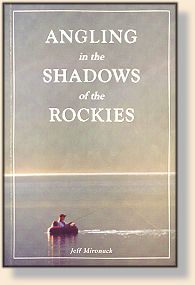Where To Start Fly Fishing
When Away From Home
By Gerry Frederick
Sometimes "Angling in the shadow of the Rockies" can be a little overwhelming.
So many waters to pick from and so little time. From New Mexico to British
Columbia, the Rockies provide the best trout fishing in North America. I don't
believe many fishermen wil argue with this assessment. Here in lies the dilemma.
Where to start. I suggest we start at home.
As is true with all outdoor activities preparation is important. Every fisherman
has a few stories to tell of fouled trips from lack of preparation. I truly believe
that I hold the crown. I'm also sure the other members of the royal court come
from my family. Perhaps more than anyone I can address the tragedy of poor
preparation. My trouble is I'm a fly fishing nut. I get excited anticipating each
trip. This excitement causes me to sometimes forget a few very important items:
fly boxes, oars, fly rod, fly reels, and on and on. What I'm trying to say is, it's
very easy to leave home unprepared.
Check Your Gear
Take time to check all the gear you plan to utilize on your fishing trip. It doesn't
take long to check for worn out components, missing reel screws and the like.
Clean and inspect very closely all the fly lines you'll bring. Don't forget to make
an inventory of the fishing vest. In keeping with historical fly fishing tradition
bring four of five times more stuff than you'll ever use. This small detail helps
build confidence and give the outward appearance of someone who knows his
or her way around the fishing hole.
If you have chosen a fishing destination that is at all remote bring some extra
gear. This may include everything from underwear to complete rod and reel
set ups. Extra equipment will set your mind at ease and help keep you
focused on the fishing. Remember if a little is good, a lot must be better.
Pick Your Angling Destination
Location is everything. The fly fishing opportunities in the Rockies are endless.
Maps, magazine articles, book and fish stories all play big factors when we are
searching out new waters to fish.
In the southeast region of British Columbia where I call home, I generally know
what to expect. I start with a location. I have fly fished this region for more than
ten years, guided for two years. Once I decide where to fish I can draw on some
of my own history. From time to time I have the good fortune to take my fly
fishing obsession on the road. I always pick new water to fish. Topographic
maps make this process a lot faster. The most recent updated maps if you can
find them. I like to pick 3 or 4 locations in a given region. When one doesn't
work out I can move on.
When traveling on fishing trips in the Rockies it's important to get as much local
input as possible. The local fly fishing information we gather can help with what
we can expect. Most local fly shops and tackle dealers will give us, "out-of-towners",
the straight goods on hot spots and what to start with. They all have an interest
in fisherman doing well in their backyard.
Trip Planning
It can't be understated, the importance of trip planning. A lot of time can be
wasted if a river is closed or out of season after we have traveled three or
four hours to be there. Get the info anyway you can. Time permitting, write
for as much information as you can get your hands on. Sometimes the library
can get us off on the right foot. I believe the map is still number one. Without
a good map fishing trips away from familiar surrounds rarely go well. A popular
trick in my family is to keep a good collection fo topographical maps in the
"John" along with all the fly fishing magazines. Another point to remember is
where you plan to stay. I strongly suggest a reservation at a campground or
motel. In 1994 I went on a fly fishing trip to the Bitteroot region of Montana
for five days. I started looking for a motel at 9:30 at night and at midnight
found myself parked in the car at the water edge tilting the seat back for a few
hours sleep. Even for a fishing nut like myself, sleeping in the car was not
what I had in mind.
There was one small positive however. When I opened my eyes I was
looking over the Bitteroot river and a dozen or so fish feeding near the
bank. I was rigged and casting for them in a record 8 or 10 minutes.
K.I.S.S.
A very large part of my fly fishing philosophy is Keep It Simple Stupid,
K.I.S.S. The simple approach works well when fishing unfamiliar
waters. Keeping the gear and flies down to a simple, manageable
assortment. This not only helps with traveling, but helps keep us
focused on the task at hand. Fishing a new region will keep us busy
enough. Go with what you know. Utilize the flies and techniques
that work at home.

Most fly fishers, experienced and beginners alike, don't need me to
tell them to keep it simple. Sometimes we can get caught up with
new gear and techniques. Learning and using new techniques is
important to any advancement in individual success. I believe it's
important to try new things. That can be one of the best aspects
of fly fishing. However, when I suggest, go with what you know,
I mean just that. Take a fly and a technique that you have the most
success with and utilize it. This will keep you in your comfort zone.
After all the important pre-trip preparation is done, we're ready.
Ready for challenging new adventure away from home. When fishing
in unfamiliar areas, maps are important as are local angling regulations.
Fly fishing new waters presents an array of challenges. Most are
welcome unknowns that fly fishing nuts like myself look forward
to conquering. A large part of the appeal is showing off your
ability to read water and catch fish. Most of the time you're only
showing off to yourself. ~ Gerry Frederick
Continued next time!
Credits: From Angling in the Shadows of the Rockies
by Jeff Mironuck. We thank
Frank Amato Publications, Inc. for use permission!
Our Man In Canada Archives
|



